April 20, 2022 Minutes
Faculty Senate Meeting (Leon Johnson 346)
04.20.2022
3:15pm – 4:30pm
WebEx for those not able to attend in person:
|
Name |
Represents |
Attended |
|
Watson, Bradford |
Chair |
x |
|
Brody, Michael |
Chair-Elect |
x |
|
Amendola, Roberta-Webex |
EN/Mechanical & Industrial Engineering |
x |
|
Brookshire, Jack |
AG/Land Resources |
x |
|
Carson, Robert |
EHHD/Education |
x |
|
Caton, Gary |
Business |
x |
|
Coffey, Jerry-Webex |
Emeritus Faculty |
x |
|
Cowan, Susanne |
AR/Architecture |
x |
|
Dale, Catherine |
AR/Film & Photo |
x |
|
Dratz, Ed |
LS/Chemistry & Biochemistry |
x |
|
Ellis, Colter |
LS/Sociology & Anthropology |
x |
|
Flory, Dan |
LS/History & Philosophy |
x |
|
Gao, Hongwei-Webex |
EN/Electrical & Computer Engineering |
x |
|
Gedeon, Tomas |
LS/Mathematics |
x |
|
Hansen, Andy-Webex |
LS/Ecology |
x |
|
Herman, Matt-Webex |
LS/Native American Studies |
x |
|
Hill, Andrew |
AG/Agricultural Economics |
x |
|
Izurieta, Clemente |
EN/Computer Science |
x |
|
Lachapelle, Paul-Webex |
LS/Political Science |
x |
|
McWethy, David |
LS/Earth Sciences |
x |
|
Moyce, Sally |
Nursing/On Campus |
x |
|
Orendorff, Karie-Webex |
EHHD/Health & Human Development |
x |
|
Rognlie, Juli |
Gallatin College |
x |
|
Stoneback, Sarah |
AR/Music |
x |
|
Thomas, Amy-Webex |
LS/English |
x |
|
Tillack, Peter |
LS/Modern Languages |
x |
|
Van Emon, Megan-Webex |
AG/Animal & Range |
x |
|
Walach, Michael |
AG/Agriculture Education |
x |
|
Walter, Mat-Webex |
Extension/Off Campus |
x |
|
Young, Scott-Webex |
Library |
x |
|
Alternates |
Represents |
Attended |
|
Fuller, Kate-Webex |
Extension/On Campus |
x |
|
Hatch, Jeremy |
AR/Art |
x |
|
Gannon, Paul |
EN/Chemical Engineering |
x |
|
Stowers, Steve-Webex |
AG/Microbiology & Cell Biology |
x |
|
OTHER ATTENDEES |
Represents |
Attended |
|
Adams, Dean-Webex |
Center for Faculty Excellence |
x |
|
Babcock, Michael |
Earth Sciences |
x |
|
Bolte, Jason-Webex |
School of Music |
x |
|
DeWeese, Josh |
School of Art |
x |
|
Donohue, Ariel-Webex |
Diversity & Inclusion |
x |
|
Fastnow, Chris-Webex |
Planning and Analysis |
x |
|
Lee, Ilse-Mari |
Honors |
x |
|
Ogilvie, Craig-Webex |
Graduate School |
x |
|
Provost Mokwa |
Provost |
x |
|
Sobek, Durward |
Provost Office |
x |
|
Swinford, Steve |
Provost Office |
x |
|
Weber, Liz |
Bozeman Daily Chronicle |
x |
I. Call to Order
a. Meeting was called to order at 3:15.
II. Approval of FS Minutes from April 06, 2022
a. Tomas Gedeon moves to approved. Seconded by Andrew Hill. None opposed. No abstentions. Approved.
III. FYI items
a. Course Evaluations Open April 25 thru May 06
i. https://www.montana.edu/facultyexcellence/teaching/courseevals/index.html
b. MyInfo Rolling Upgrades
i. https://www.montana.edu/uit/pmo/currentprojects/myinfoupgrade/
c. Updated MSU Policy and Procedures website
i. https://www.montana.edu/policy/
d. Senator Hour, Monday 11:30-12:30 and Thursday 10:30-11:30 via WebEx
IV. Information Updates:
a. Listening Session regarding proposal to name Gianforte Hall
i. Wednesday, April 24 from 4:30-5:30 in SUB 235
ii. https://www.montana.edu/calendar/events/41851
iii. Written comments due by May 16
iv. Paul Lachapelle
A. What information will the university use to decide about the Gianforte building naming? Given that everyone I have talked to sees this as a done deal already, is this listening session just a formality, and a façade? Or has the university stated how the input they get there will factor into their decision? I think we all deserve to know that.msunews@montana.edu
b. Survey of Deans
i. Paul Lachapelle
A. Will there be surveys on other administrators?
1. Yes. Department Heads will be surveyed next.
B. When was the last time a dean survey was done?
1. About 8 or 9 years ago
c. MUS Learning Management System
i. https://www.mus.edu/che/arsa/LMS/SingleLMS.html
ii. Please complete the survey to inform the RFP
A. 
iii. An Analysis of Summer School 2021, Vice Provost Sobek
A. Approach to Summer ‘21
1. Offer a mix of face-to-face and online options
2. Continue the non-resident tuition discount
I. ~$1,000 for 3-credit course
3. Decrease distance learning fee to $10/credit
4. Focus on high-demand and gateway courses
I. Writing, math, chemistry, physics, core
5. Sprinkle in unique-to-MSU courses
I. E.g., field-based courses
B. Sections Offered
1. More sections offered overall versus last two years
2. Roughly even split between in-person and online modalities
3. 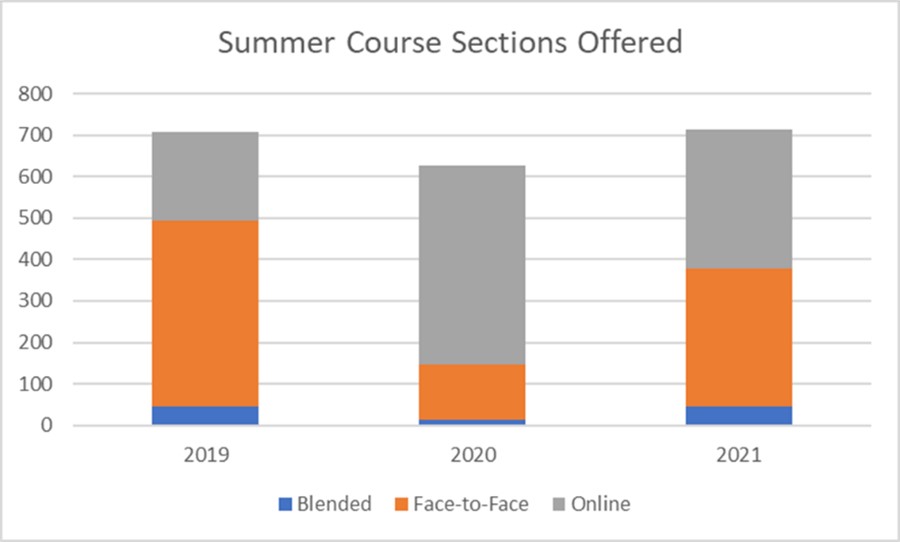
C. Sections Offered by Session and Modality
1. Online courses dominate most sessions
2. Most of the in-person courses offered in 12-week session
3. 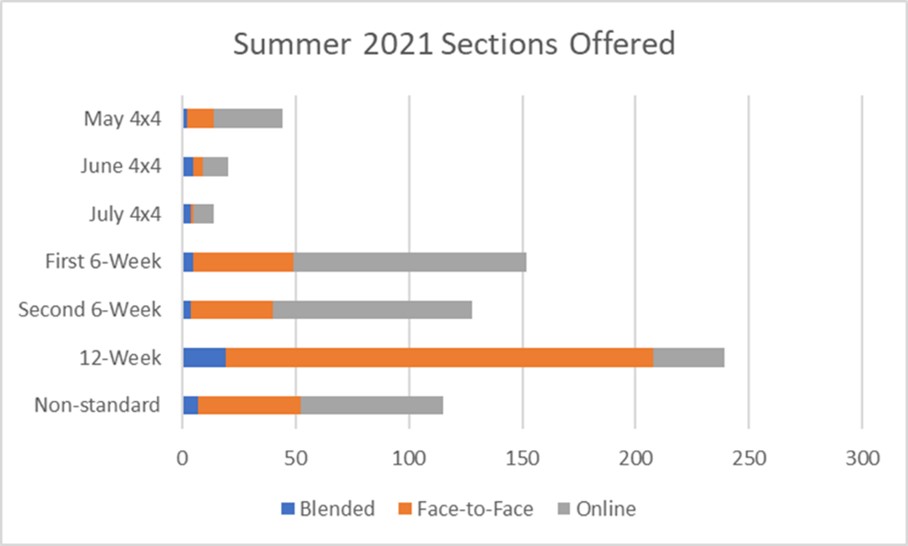
D. Total Enrollment
1. From 2020 to 2021
I. Undergrads decreased
II. Grad students increased
III. Resident students decreased
IV. 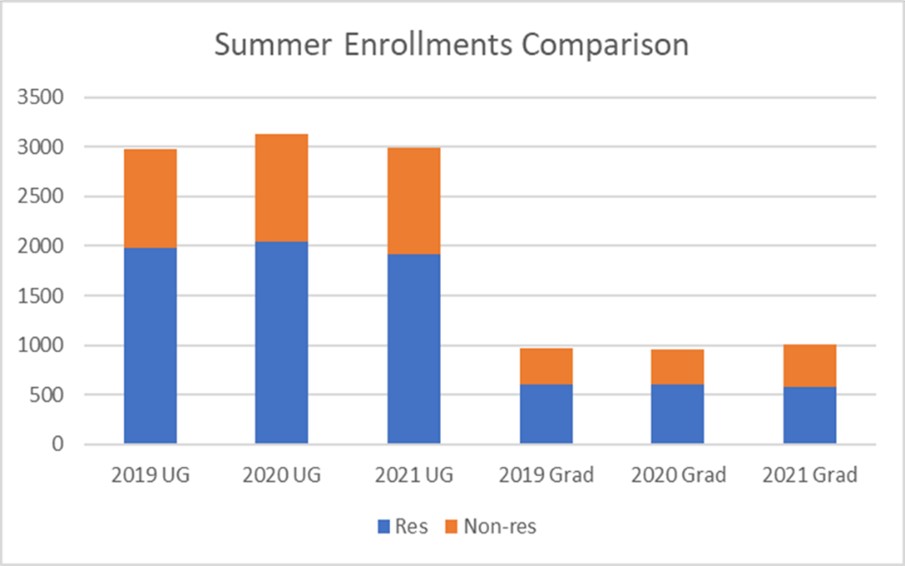
E. Enrollment by Summer Session
1. Slight increase in 4x4 enrollment over 2020
2. Continued popularity of 6-week courses versus 4-week courses
3. 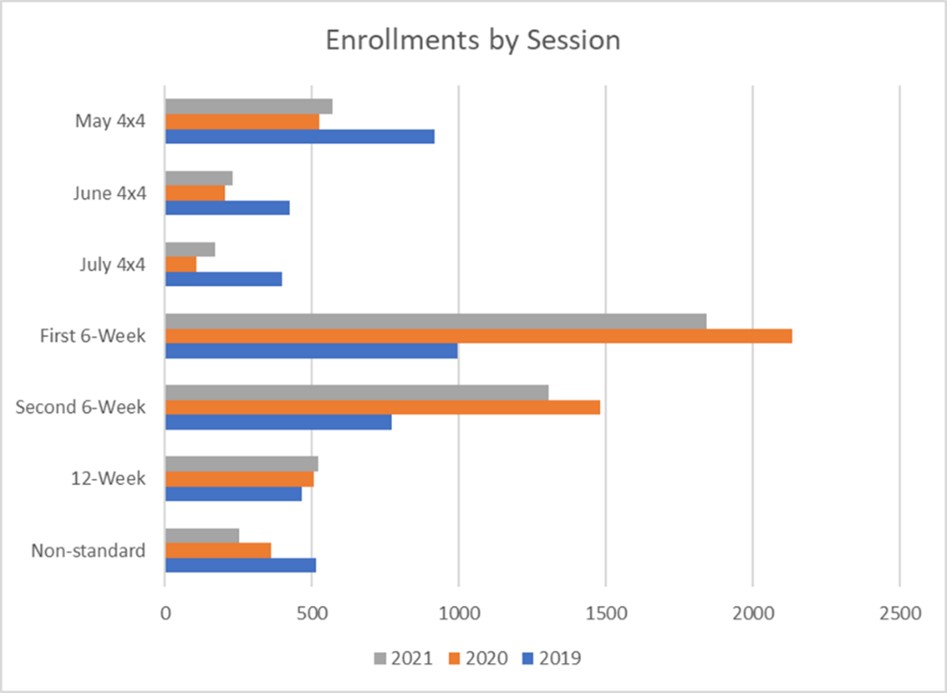
F. Grade Distributions
1. % A’s increasing
2. % B’s and C’s decreasing
3. % F’s is worrisome
4. 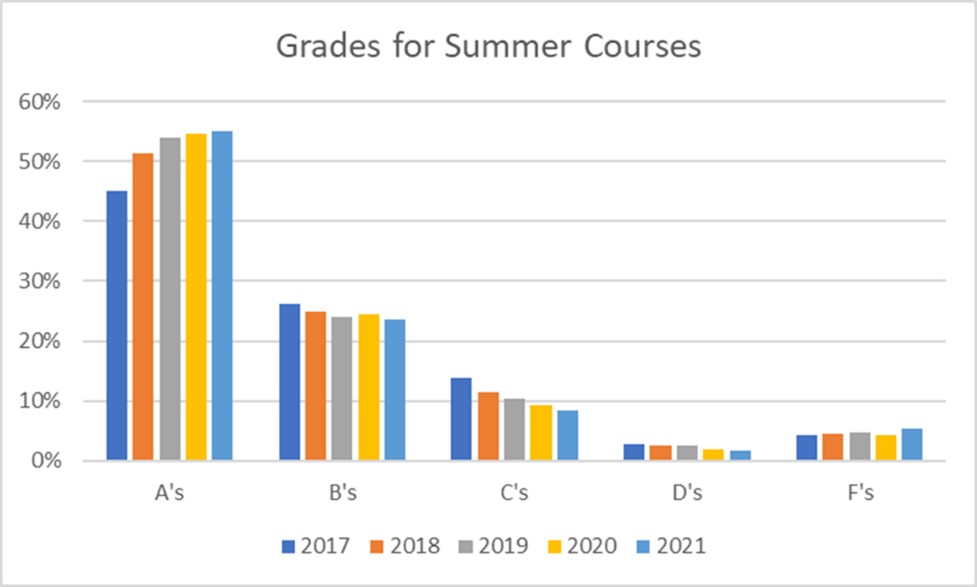
I. This is not stratified. It is by year.
1. A lot of summer courses are math and math are harder in a 4-week session.
a. Most 4 credit courses are offered in the 6-week format, not the 4 week.
G. Revised Summer Returns Model
1. Purpose: Create additional incentive for academic units to offer summer courses
2. Adjusted per SCH return values
3. Included internship credits
4. Capped total return to colleges at 22% above cost
H. 2021 Returns as Percent above Instructional Cost (aka, return on investment)
1. 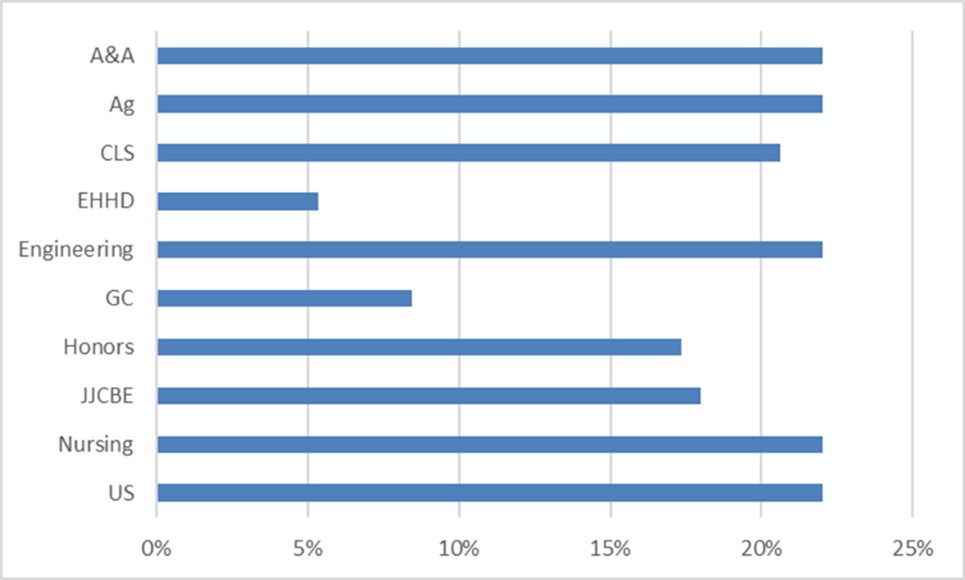
I. Recommendations for Summer ‘22
1. Continue with the same summer returns model
2. Continue to offer face-to-face and online options
I. Flexibility to meet student interest, needs
3. Investigate efficiencies in graduate course offerings
4. Promote and market summer school more heavily
5. Encourage departments to offer high DFW courses and innovative summer experiences for students
6. Math: focus on students between 1st and 2nd years rather than incoming students; consider Hilleman-type model
7. Questions
I. How many students are making up a course that they have failed previously?
1. Did not do those numbers.
d. Honors College Curriculum, Dean Lee
i. The mission of the Honors College at Montana State University is to prepare academically motivated students to think critically and independently within a challenging and supportive community, by partnering with all other colleges, departments, and programs at the university.
ii. Honors College Program Learning Outcomes
A. Integration: Honors students will be able to integrate concepts and methodologies from multiple disciplines and diverse viewpoints in Honors seminars
B. Research: Honors students will engage in research, using appropriate disciplinary and scholarly skills, resulting in a senior thesis
C. Critical thinking: Honors students will continually develop their ability to think critically and independently by actively engaging in discussions of complex issues throughout the Honors curriculum
D. Communication: Honors students will communicate clearly and precisely in multiple formats including written prose, verbal exposition, and audio/visual projects.
E. Community Engagement: Honors students will engage in activities that promote civic mindedness, global citizenship and the stewardship of our natural environment
iii. Honors Enrollment by College, Fall 2021
A. 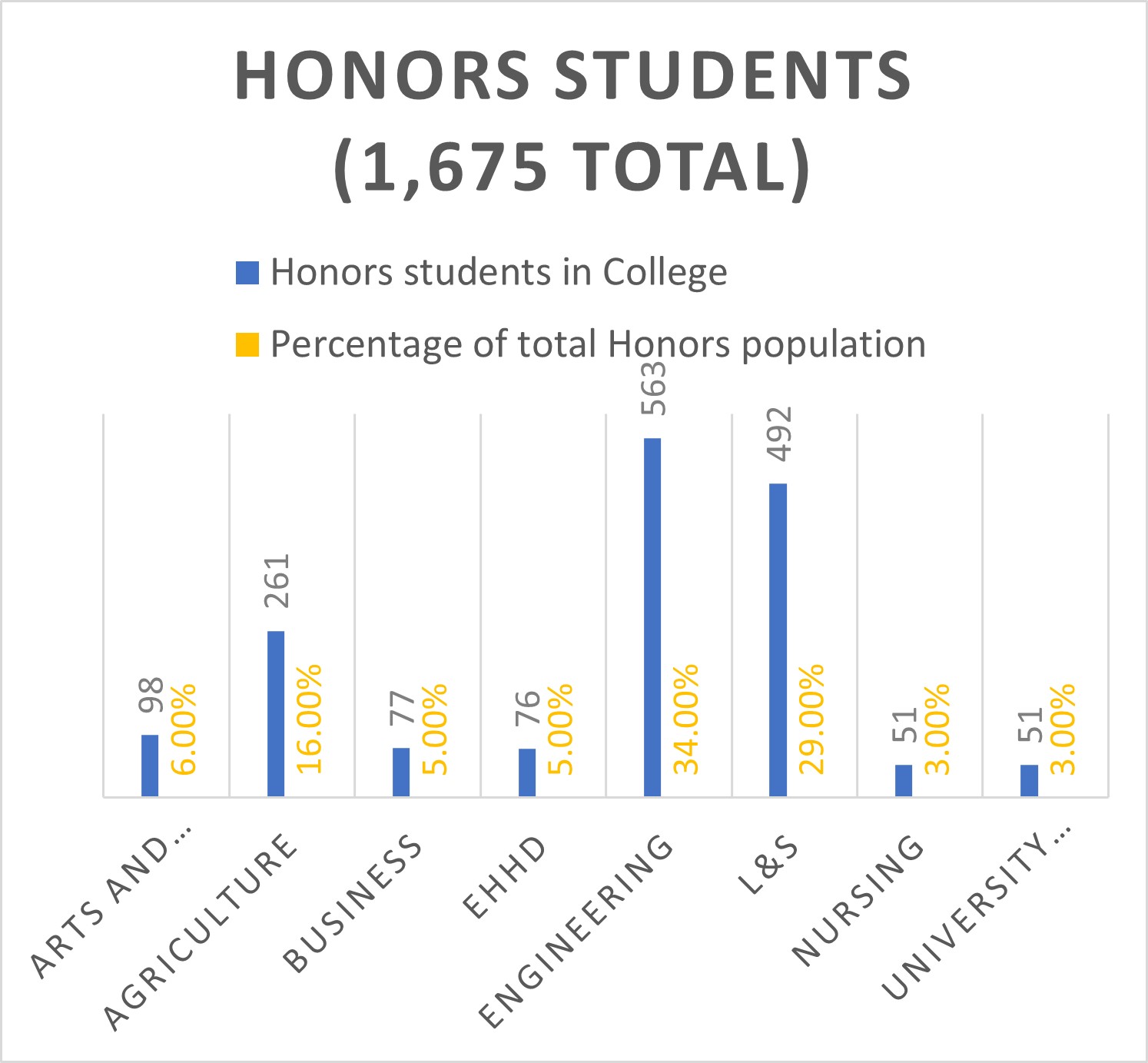
iv. AY2021-22 Honors Graduates by College
A. December 2021: 53 graduates, May 2022: 160 graduates (213 students)
1. College of Agriculture: December (8), May (32)
2. College of Arts and Architecture: December (0), May (4)
3. JJCBE: December (1), May (6)
4. EHHD: December (7), May (10)
5. NACOE: December (16,) May (57)
6. Letters and Science: December (18), May (95)
7. Nursing: December (3), May (3)
8. DIS: December (0), May (3)
v. 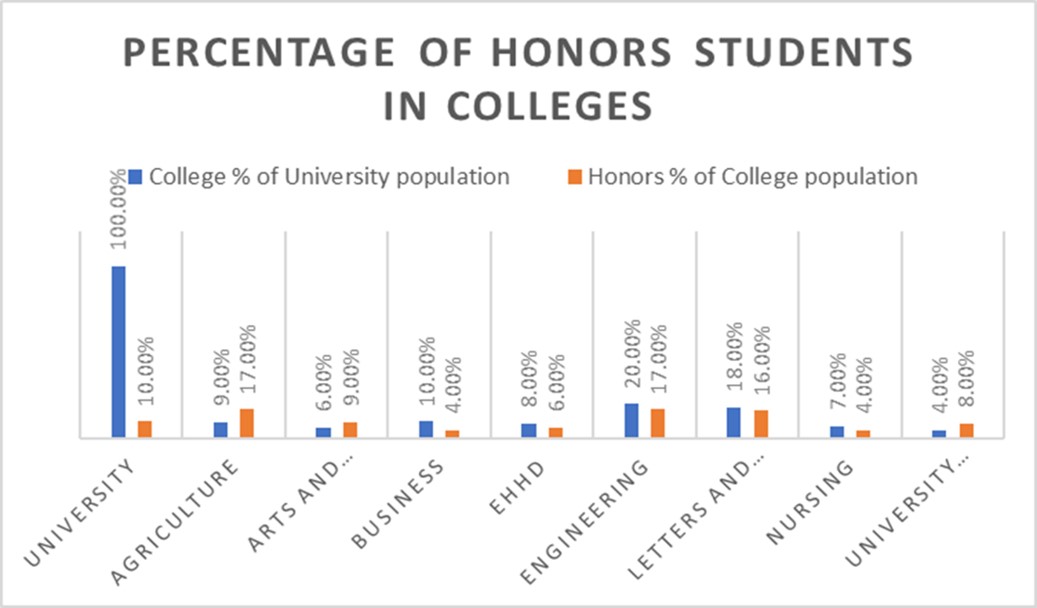
vi. Departmental Honors Classes-funded by the college
A. Arts and Architecture
1. ARCH 151RA and 152 – Design Fundamentals I and II *
B. JJCBE
1. BGEN 104US – Business and Entrepreneurship Seminar
2. BMGT 205 (Spring 2023) – Professional Business Communication
C. NACOE
1. CSCI 127 – The Joy and Beauty of Data *
2. EELE 101 – Introduction to Electrical Fundamentals*
I. * Denotes class taught by tenure track faculty
D. College of Letters and Science-contains the bulk of honors courses.
1. CHMY 151/152 – Honors Chemistry I
2. CHMY 153/154 – Honors Chemistry II
3. CHMY 331/332 – Honors Organic Chemistry I
4. CHMY 333/334 – Honors Organic Chemistry II
5. ERTH 201IN – Honors Earth Systems Science
6. ECNS 251IS – Honors Economics
7. M181Q – Honors Calculus I
8. M182 – Honors Calculus II
9. M283Q – Honors Multivariable Calculus
10. M284 – Honors Differential Equations
11. PHSX 240 – Honors General and Modern Physics I
12. PHSX 242 – Honors General and Modern Physics II
13. PSYX 110IS – Honors Intro to Psychology*
14. BIOH 409 – Advanced Human Torso Anatomy
15. BIOH 411 – Advanced Human Anatomy
16. SOCI 110IS – Honors Sociological Inquiry*
I. * All taught by tenure track faculty, except for those indicated with an asterisk
E. Honors Courses-all are interdisciplinary
1. HONR 123 – Hike and Read
2. HONR 124 – Ski and Read
3. HONR 131 – Freshman Research Symposium
4. HONR 201US – Texts and Critics I: Knowledge
5. HONR 202IH – Texts and Critics II: Imagination
6. HONR 204D – Great Expeditions
7. HONR 210 – Mentoring Gifted Students
8. HONR 275 – Extreme Microbiology in Yellowstone
9. HONR 291 – Finding Balance: A Climber’s Journey
10. HONR 292/492 – Honors Independent Studies
11. HONR 490R – Undergraduate Research
12. HONR 450 – Advanced Honors Tutorial
I. * Courses taught by a mix of tenure and non-tenure track faculty
F. Honors Seminars-all interdisciplinary
1. HONR 400 – Death Becomes Us: The Mystery of Mortality and the Need for Meaning
2. HONR 494 – Design Thinking for Our Community (EGEN310)
3. HONR 494 – Our Nuclear Age
4. HONR 494CS – Sustainable Energy and the Future of Public Deliberation: Building Public Trust*
5. HONR 407IA – Understanding Shakespeare from Folio to Performance
6. HONR 411RS – The Art and Science of Medicine
7. HONR 408IN – Wolves in Yellowstone: A Social, Scientific and Photographic Journey
8. HONR 319 IA- The Transformative Power of Music*
9. HONR 406 – Critical Perspectives in Leadership
10. HONR 405 – The Spine of a World: Building Settings in Speculative Fiction
11. HONR 494IS – Bodies and Politics: Public Health, Health Citizenship, and Citizen Activism*
I. * Denotes seminars taught by tenure track faculty
G. Questions
1. Tomas Gedeon
I. Thank you.
V. Undergraduate Courses and Programs
a. FYI
i. Name Change from “Military Aerospace Studies” to “Military Air & Space Studies”
b. Courses – First Reading
i. PSCI 336 : European Union (Summer 2022)
ii. HVC 240 : HVAC Systems II (Fall 2022)
iii. MUSI 212IA : Choir II (Fall 2022)
c. Courses Changes– First Reading
i. ACTG 421 : Data Analytics for Accountants
A. Title changed from Accounting Information Systems II
B. Course title update to better reflect course LOs & content.
d. Courses – Second Reading
i. ELCT 111 : Electric Meters and Motors (Fall 2022)
ii. HONR 309 : Unleashing Scientific Innovation through Visual Communication (Fall 2022)
iii. LIT 343 : African American Literature (Fall 2022)
iv. PLTT 100 : Introduction to Photonics and Advanced Manufacturing (Fall 2022)
e. Courses Changes– Second Reading
i. GDSN 223 : Typography Principles
A. Update to course name to reflect accurate course themes and projects centered around typography education. This name change also helps designate thematic approaches that are different than GDSN 224; Form and Content taught in the spring semester.
ii. PHSX 301 : Mathematical Methods in the Physical Sciences
A. Title change has been agreed upon by MSU and UM collectively. Has been approved by CCN and OCHE.
B. Changing title from, Introduction to Theoretical Physics
C. Changing name to emphasize its application (and appeal) to students in the physical sciences outside of physics majors.
f. Courses Inactivations – Second Reading
i. PSCI 201 : Scope and Methods of Political Science
A. The Political Science major no longer requires PSCI 201 Scope and Methods. This change has been approved and updated in the program of study for this degree for the 2022-2023 academic year.
ii. STAT 201Q : Statistics in the World
A. Course has not been offered since Spring 2012
iii. STAT 226Q : Honors Introduction to Statistics
A. Course has not been offered since 2009
g. Programs
i. None at this time
h. Program Inactivation
i. None at this time
VI. Graduate Courses and Programs
a. Courses – First Reading
i. HDCO 540 : Mental Health, Identity Development, and Understanding (Summer 2022)
A. Needed course
B. Should fit into many programs
b. Programs / Certificates
i. None at this time
VII. Honors Courses
a. HONR courses have been going through a new process this year. As senate, are we comfortable with that process? Are we sure they are in line with other course reviews?
b. Too late for it to into the catalog
c. Would like to table this until we have more clarity on the review process for Honors courses.
d. Question/Comments:
i. Andrew Hill-would like to avoid faculty voting against faculty
ii. Tomas Gedeon-What other processes do you have in mind? How would it be different?
A. Previously, an honors course with a strong link to another colleges, go through workflow including both. This year, that didn’t happen.
B. Honors does not have a tenured faculty body. It relies on faculty across campus to teach these courses.
iii. Clem Izurieta-This to make sure due process is done on these courses?
A. CPC is a sub-committee of Faculty Senate.
B. Curriculum is owned by faculty.
1. Faculty Senate represents the faculty.
iv. Tomas Gedeon-If there is a conflict, this is the place where it should be resolved, correct? Yes.
A. New territory looking at hard numbers for Honors courses.
v. Jeremy Hatch-Goes from advisory committee straight to CPC?
A. Soft numbered first.
vi. Tomas-If it is truly interdisciplinary, is Math part of this? Is STEM? How do you decide which college has a standing in an Honors course?
A. That question is what brought this up.
B. The purpose of CPC is to do this work before coming to Faculty Senate.
1. Each college is represented on CPC.
2. College reps bring the info back to the proposer to work out any issues, then brings it back to CPC.
C. If it’s not obvious, more secondary, you would expect your representative to bring that up.
1. How do you decide how much is enough to send it through another college for review?
vii. Sarah Stoneback-Thanks for the additional info.
A. Tabling this would be in line with what the faculty would like to see. I think it would build better bonds between colleges in the long run.
viii. Unknown commentor: Comments from last meeting were unfortunate. I think we all know it’s a problem we need to solve. Why did the process change?
A. The first course that came through last year was a one-off and the workflow was changed manually to add the other entities for review.
ix. Jeremy Hatch moves to table this course with the intention to untable it at a later meeting. Gary Caton seconds. Two opposed. No abstentions. Course is tabled.
VIII. Old Business
a. Sabbatical Policy
i. See attached for proposed revisions
ii. Existing Sabbatical Leave
A. https://www.montana.edu/policy/faculty_handbook/sabbatical_leave.html
iii. BOLDED text are changes.
iv. Questions
A. Jack Brookshire: Modification to requirement to four letters is unrealistic. It’s hard enough now to find people to do them.
1. Sarah Stoneback: Agreed
2. Jennifer Thomson-Faculty Affairs: committee itself isn’t qualified to review something that is out of their expertise.
3. Provost Mokwa: Do not want to go against recommendation of FA
4. Susanne Cowan: Didn’t apply for sabbatical because could not find enough people to do letters.
5. David McWethy: Last meeting there were three other departments who raised the same issue. Think that could use further discussion.
i. That is not up to the Senate. It would be up to Faculty Affairs.
1. Jennifer will take it back to Faculty Affairs.
v. Tomas Gedeon moves to approve. Clemente Izurieta seconds.
A. Seems like there is confusion because there are two different policies on sabbaticals.
1. Only one policy. The other are recommendations.
B. We are voting on the small changes on this policy? Yes.
1. Was well reviewed in JAGS, Faculty Affairs, and Legal.
i. Minor changes to align policy with other policies. Small logistical changes.
C. None opposed. No abstentions. Approved.
b. Faculty Responsibilities
i. See attached for proposed revisions
ii. Existing Responsibilities
A. https://www.montana.edu/policy/faculty_handbook/faculty_responsibilities.html
iii. Provost Mokwa:
A. Appreciate the input and discussions. Seems that in some cases there is more reading into the language that came out of JAGS than what is actually there. Would like to provide clarification.
1. Isn’t a change from what we had before COVID.
2. Online changes happened quickly.
3. This is part of the process of bringing campus back to life.
4. Students have overwhelmingly stated they want to be engaged with faculty.
i. More engaging meetings are done face to face. Important part of our job.
5. Students don’t want to knock on a closed door.
6. Students don’t want to bother someone who seems too busy.
7. For the next few years, we are going to see students coming out of high school who are going to need that face-to-face contact.
8. We have faculty who are struggling to re-engage.
9. Know how busy you all are. Its three hours in a week.
10. Students want faculty to post office hours on their website.
11. There is still as much flexibility as we’ve had in the past.
iv. Discussion
A. Peter Tillack: Was there a stipulation of how many hours we were to be in our office before this?
a. Provost Mokwa: Not from Academic Affairs, but through departments and colleges.
i. Establishing a basis of expectations.
B. Tomas Gedeon: Agree the doors should be open.
a. First sentence says it all: “Be available to students outside of class through regularly scheduled in-person office hours and individual student appointments.”
C. Jack Brookshire: Is there an intent to police this? What are the consequences?
a. Provost Mokwa: Do not see policing occurring. Dept. Heads say they need help. Policy is to provide clarity. The more clarity to establish a baseline the better.
i. Some may see the three hours to be the minimum, some see it as the maximum. It is a baseline.
D. Ed Dratz: Have a hard time getting students in during office hours. Works better for them to make individual appointments.
E. Andy Hansen: Ecology had a lengthy discussion on this topic. Committed to excellence. Meeting with students in ways that are good for them. Think the language would do well to recognize the avenue of online meetings WITH in person. Have found online meetings to be effective and efficient. See the value in online appointments in addition to face to face.
F. Colter Ellis: On board with doors open. Also, by doing some online, I am able to have MORE time with students. Have webex meetings with students while they are on their break at work. Increases capacity to have that contact. We cannot undervalue that. I don’t want to be an “online professor”, but there is value I that.
G. Clem Izurieta: CLS says the same thing. Some do well in person. Online also works. Agreed three hours minimum in person is good. Don’t see the issue here. We can do both. Three hours in person with the addition of online.
H. Sally Moyce: Is this just for TT faculty? Faculty handbook is for TT. If it isn’t in the CBA it also applies to NTT, this is just for TT faculty.
v. Are we asking if we are going to add language?
A. If the body wants to see revisions, we could agree to send it to JAGS.
B. Peter Tillack: Online is a very viable way for students to reach us. Students don’t come, in general, to come when they have something specific. Office hours are open.
a. Would like to see language that speaks to the “spirit” of this.
vi. Will ask JAGS to have further discussion on the language.
IX. New Business
a. Strategic Plan Priorities
i. A year from now: Being voted on in Planning Council. In D2L there is a ranking. Want faculty to rank the top three priorities that are important to their constituencies.
X. Senators’ Open Conversation
a. None
b. Executive session
i. Nomination for Chair Elect
A. Jennifer Thomson was unanimously elected.
XI. Public Comment
a. None
XII. Adjourn
a. Tomas Gedeon moves to adjourn. Gary Caton seconds. Meeting was adjourned at 4:48pm
